This page contains some affiliate links. Please review my disclosure policy.
Learn all of the benefits of Rose Water, including a step-by-step tutorial on how to make rose water! Not only will you learn how to make homemade rosewater, but you’ll get a DIY Rosewater Face Toner recipe too!
Read on to learn how to make this nourishing rose water at home!
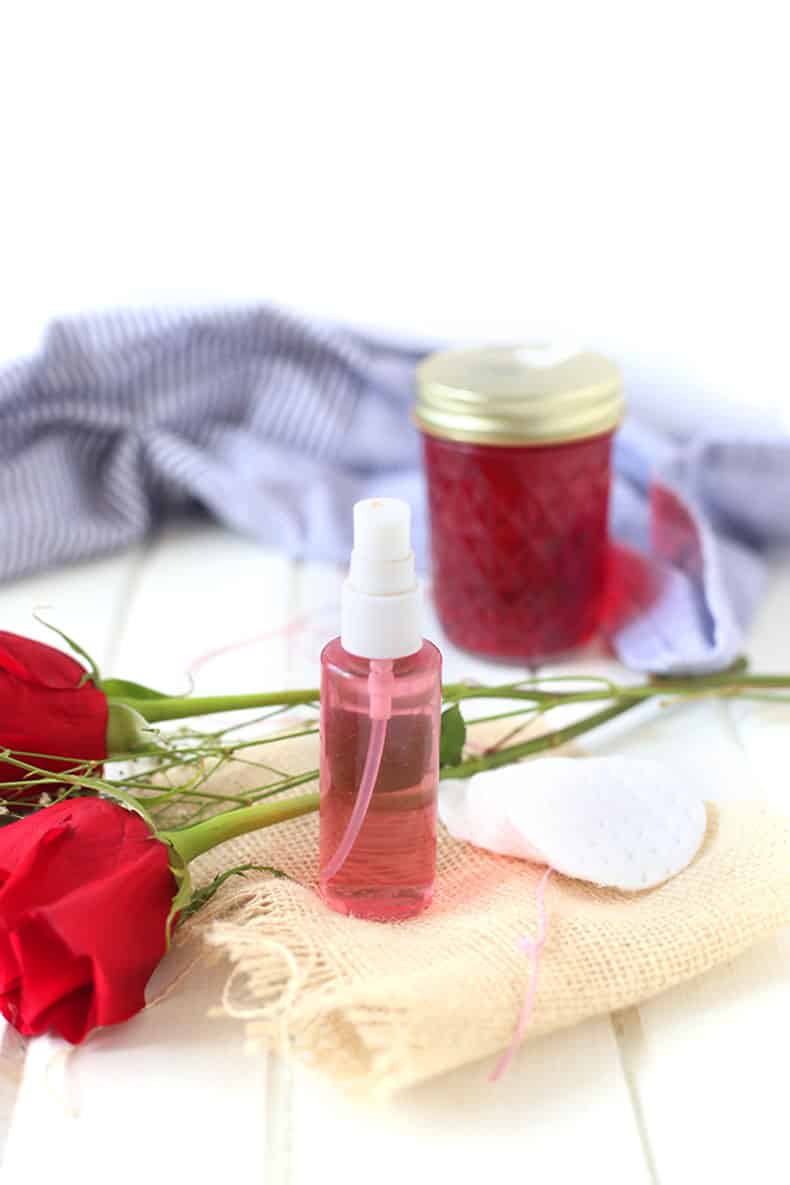
Table of Contents
By now most of you know I love a little DIY. From homemade kombucha to bath salts, if I have an ounce of free time I’m probably doing a DIY.
It just feels good to make things from scratch (probably why I have a blog!) and this rosewater is no exception.
Not only am I going to walk you through how to make rose water, I’m also sharing the benefits of rose water and its many uses, including a recipe for homemade rose water toner.
Be sure to check out my step-by-step video…
★★★★★
This rose water recipe has 5 stars from over 30 reviews! Ryan says:
“This turned out fantastic! Thank you very much!!”
Check out my video showing you how to make rosewater:
I’m walking you through how to make your own rose water step-by-step.
What is Rose Water?
Rosewater is exactly as it sounds, roses + water. It gives you all the benefits of water plus the bonus of the anti-inflammatory and hydrating advantages of rose. Plus it smells awesome.
Rosewater is used in some cuisines for flavor, but I find myself using it most frequently in my skincare routine. People live and die by this stuff, but I’m not desperate enough to spend $10 on a small bottle. Especially since it’s so easy to make at home.
Fortunately, I’m thrifty and was able to make over 3 bottles for the same price. Love me a good deal, and especially when the DIY version is stupidly easy.
What are the benefits of rose water?
- helps balance the pH of skin
- soothes skin irritation
- reduces redness (has anti-inflammatory properties and antibacterial properties!) including rosacea, acne and eczema
- may reduce fine lines and wrinkles
- some evidence the smell can reduce anxiety
[source]
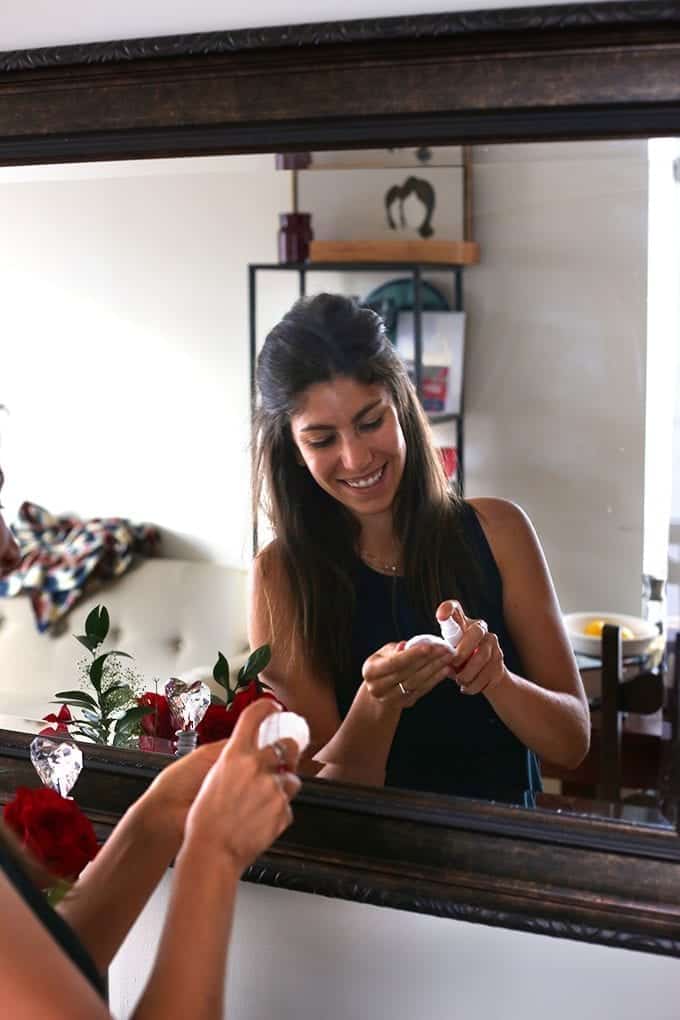
Ingredients in Rose Water
This rosewater recipe is super simple and requires just two ingredients:
- Fresh Rose petals – use organic fresh roses if you can find and be sure to rinse them well as if there’s any pesticides, dirt or grime (or mold) it will end up in your rose water.
- Distilled water – make sure you use distilled water or else you’ll need to use the distillation method where you flip your pot lid upside down using just regular tap water.
How to Use Rose Water:
Now for some of the ways I like to use this homemade rose water in my skincare routine:
1. Skin Toner – by and far this is the #1 way I like to use it. Apple cider vinegar can also be a great skin toner, but let’s be real rosewater smells so much better and is just as effective. See recipe below to use as a facial spritz.
2. In the bath – I’ll add about a cup to my bath water for extra hydration and relaxation from the scent.
3. Natural Perfume– we’ll get into the discussion of conventional perfume another day, but let’s just say you are far better off sticking to this natural fragrance.
4. Face refresher/Make-up setter – Spray this on your face when you’re at your 3:00 PM slump or just a low mood…it works.
These are just a few of the many ways you can use rosewater. Now that I’ve hacked a super easy and cheap version for you, I challenge you to go out and experiment! But if you air on the side of caution, try my DIY Rose Water Face Toner. I promise you will be in love (roses included).
How to Store Rosewater:
This rose water recipe makes a big batch so I like to store my rose water in the refrigerator.
How Long Does Rosewater last?
If you store rose water in a clean and sterilized jar it should last in the fridge for up to 6 months.
More Homemade Skincare Products
- Homemade Natural Deodorant
- How to Make a Sugar Scrub
- DIY Lip Scrub
- How to Make Bath Salts
- DIY Salt Scrub
How To Make Rose Water
Learn all of the benefits of Rose Water, including a step-by-step tutorial on how to make rose water! Not only will you learn how to make homemade rosewater, but you’ll get a DIY Rosewater Face Toner recipe too!
- Prep Time: 5 minutes
- Cook Time: 25 minutes
- Total Time: 30 minutes
- Yield: 1.5 litres 1x
- Category: Skincare
- Method: Boil
Ingredients
For the Homemade Rose water:
- Organic Roses (as many as you like-I use 7 stems)
- Distilled water (enough to cover the rose petals- I use about 1.5 litres)
For the Homemade Rosewater Face Toner:
- 1 tbsp pure rosewater (recipe above)
- about 4 tbsp of distilled water (or enough to fill your spray bottle)
- 1 2.5 ounce spray bottle
Instructions
For the Homemade Rose Water:
- Remove petals from stems and run them under lukewarm water to remove any leftover residue.
- Add petals to a large pot and top with enough distilled water to just cover (no more or you’ll dilute your rosewater).
- over medium-low heat bring the water to a simmer and cover.
- Let simmer for 20-30 minutes or until petals have lost their color and are a pale pink.
- Strain the mixture into a large bowl to separate the petals from the water.
- Discard petals and pour water in a clean glass jar to store.
For the Homemade Rose Water Face Toner:
- Combine all ingredients in spray bottle and shake.
- To apply: spray mist directly on face or spray a cotton pad and wipe face to remove any residue.
*Note: Using 7 stems makes around 1.5 litres of rose water. This seems like a lot but it keeps for a long time in the fridge. Just store in a sealed, glass container until ready to use.
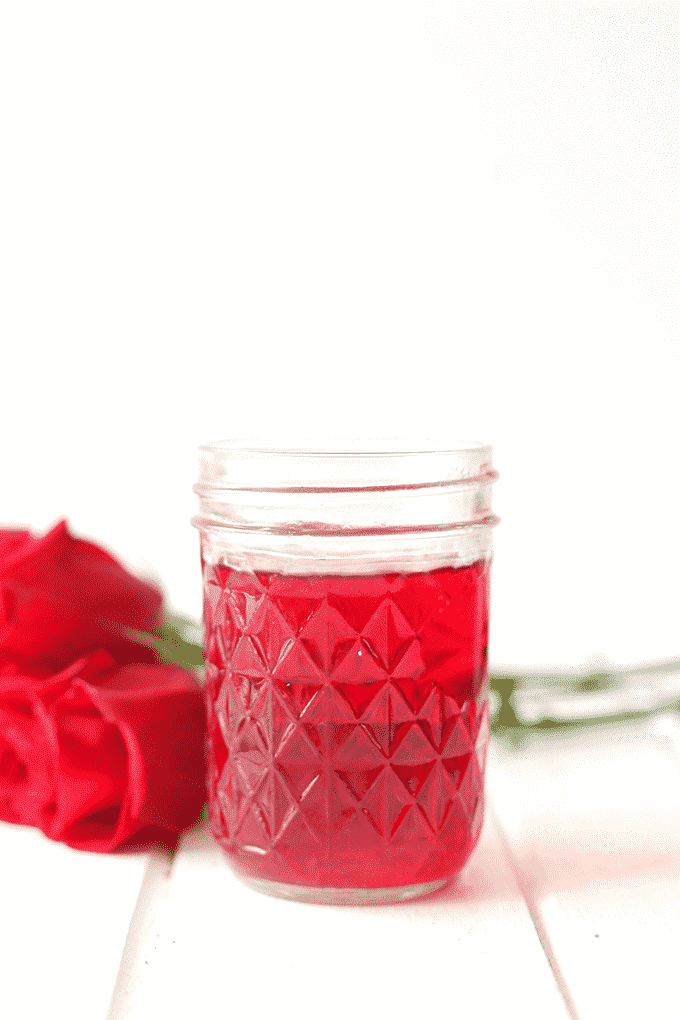
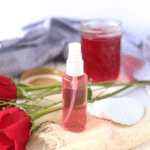

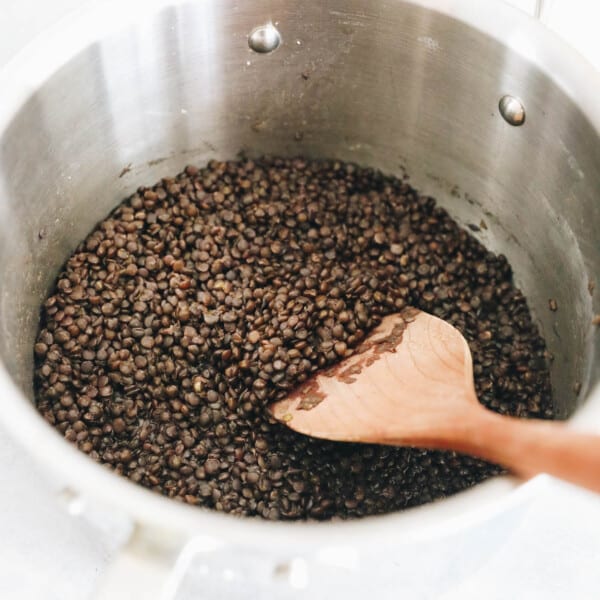
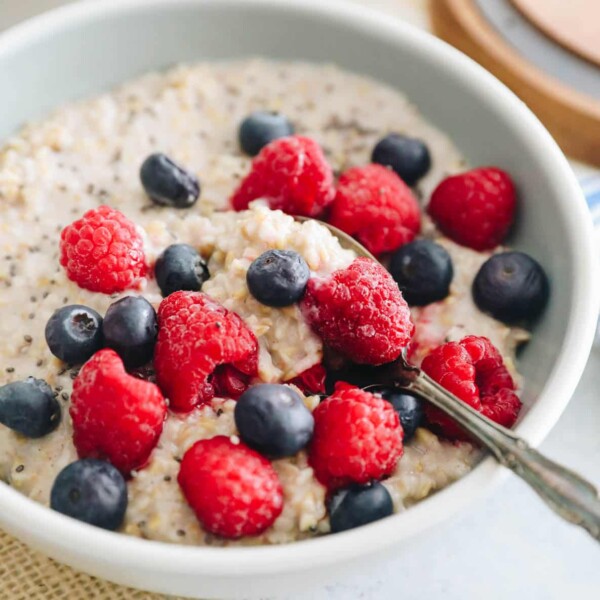
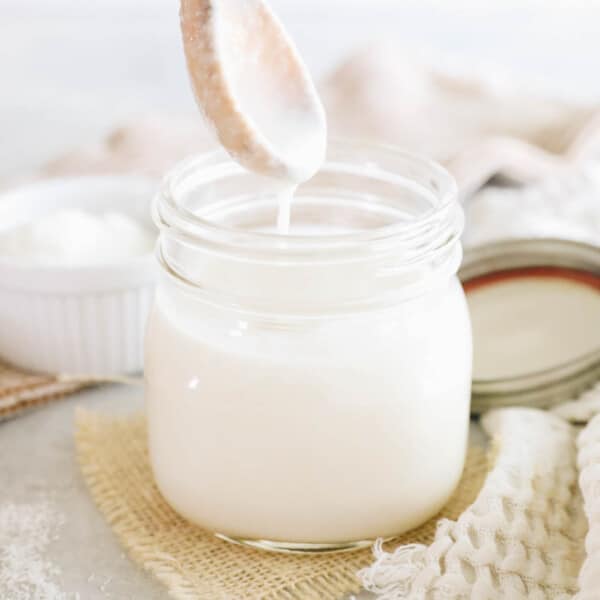






That’s a great idea. I want try it. Thanks you!
i used this homemade rosewater..but i noticed that stains are appeared on cotton cloth and tiles…does it caouse any stain on my face?does it fades my skin?
You may want to update this post to better serve your readers. Skin is waterproof, we do not absorb water through our skin, therefor it’s impossible for us to receive the benefits of water through our skin. The only way to receive the benefits of water is to drink it. But please do not take my word for it, conduct your own research to come to a conclusion on your own. Other than that, this post is great and roses really are wonderful for the skin! It’s nice to see people embracing healthier and natural alternatives to the mainstream products full of junk.
100% Organic, Rose Care , Complete Care for Your Rose Plants
Hi, can this water be drank? Or is it only for external use?
Yes, you can drink this rosewater. Better yet half dilute it with water and pour into ice cube tray and use as ice cubes. Roses are not harmful or poison for human consumption. Allergies might be something to look out for however. Only the thorns contain some irritating properties like any thorn on any plant. Some roses, in fact are sweet due to their natural sugars, hence there wonderful smell. You can eat the petals. Here is a website I just found you might like, it has a few recipes about cooking with roses as a flavor. From desert to drinks, and even one with sea bass. https://www.epicurious.com/ingredients/how-to-cook-with-roses-gallery There is a plethora of them out there.
Love this. To the lady who’s skin turned pink…if they were store bought sometimes they will add like food coloring to flowers to make the colors bright. That could be what happened.
I used this recipe but I heated the water and rose petals on the stove to boiling, then simmered for 20 min. Then I strained and sealed in hot jars, like with canning any other type of thing. The color turned out to be a bold red. Lovely! I anticipate that this process would aid in a long shelf life.
Thanks For The Recipe. Rose water is the best skin care agent. Best DIY
I made some but it grew mould very quickly. Does yours ever get mouldy? How can I prevent this?
You can add a 1-2 Tbs of vodka depending on the amount you are making -About a tsp for every 12 oz (0.45 kg).- while you are simmering the rose water. Right around 10 minutes before you are done simmering it, or after 7-10 minutes of stove time. Don’t over boil as the roses will lose their effectiveness. Simmer until the smell of the vodka is gone. I say vodka because regular isopropyl alcohol will just strip the roses of their flavor and smell. I use vodka (just the cheapest bottom shelf is perfect actually) because, one it tends to bring out the flavor just a bit more than without it, and two, it kills any germs that may have slipped into your water/jar and that straight boiling can sometimes miss. Its clear, strong and flavorless and yet while remaining effective it’s not so strong as to change the properties of the flower itself. Also, roses are a natural, but mild anti-biotic and astringent so it may be that your container had contaminates in it. Its always good practice for any DIY projects such as this to boil all your containers including lids and any gaskets or sprayers for fifteen minutes, of course after you’ve washed them (even if you just took them out of the dishwasher), and then leave on a freshly laundered towel to dry. Be careful not to burn yourself or drop and break any glass. They will be hot even if the water seems to have cooled off (you shouldn’t leave them in there after you’ve boiled them for that long anyway). Sometimes there are even little pockets of near boiling water in the crevices of your containers. I learned from personal experience. Nice zen interruption if anything. Use good gripping tongs or a thick BBQ skewer that you can stick in the opening to lift the container out of the hot water easily and safely. When the water cools it can collect new germs fairly soon as lukewarm is a haven for those things. So if you don’t remove them to dry fairly quickly you might want to reboil them for another fifteen minutes. If you do make your rose water the way I have defined, your rose water can last airtight shelved for a good couple years. Once opened one should refrigerate the capped or otherwise in closed rosewater for up to 12-16 wk’s. Or 3-4 months If you don’t have the time space or capacity for all of that, and your sill receiving mold then perhaps you missed something like rinsing the petals or maybe its just collected pollen. If you don’t completely sterilize it’s absolutely imperative to refrigerate the rose water to 40deg F. or below when you are not using it.
They wouldn’t burn after and probably fall apart…try rose essential oils